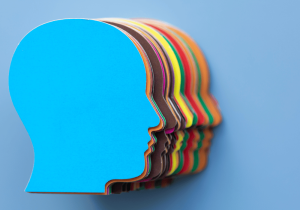Pride Month is a time of celebration, reflection, and advocacy for the LGBTQ community. It honours a long history of resilience and progress while acknowledging the work still needed to create an equitable world for LGBTQ individuals. However, amidst the festivities, we must also shine a spotlight on mental health, an area where many in the community face unique and significant challenges. Mental well-being is deeply interconnected with the fight for equality, and understanding the nuances of LGBTQ mental health is key to fostering a compassionate, supportive society.
This article explores the unique mental health challenges faced by LGBTQ individuals, the impact of discrimination and stigma, the critical need for acceptance, and the resources available to support the community. By shedding light on these issues, we hope to promote empathy, awareness, and actionable change.
Understanding Unique Challenges Related to LGBTQ Mental Health
 The LGBTQ community is no stranger to adversity. While strides have been made toward greater acceptance, many LGBTQ individuals continue to face unique mental health challenges rooted in systemic issues. Discrimination, stigma, and lack of acceptance can create environments that foster chronic stress, significantly impacting mental well-being.
The LGBTQ community is no stranger to adversity. While strides have been made toward greater acceptance, many LGBTQ individuals continue to face unique mental health challenges rooted in systemic issues. Discrimination, stigma, and lack of acceptance can create environments that foster chronic stress, significantly impacting mental well-being.
For many LGBTQ individuals, coming out is both a personal milestone and a potential source of anxiety. Fear of rejection from family, friends, or colleagues often weighs heavily, and societal pressures can amplify these fears. Studies consistently show that LGBTQ individuals experience higher rates of anxiety, depression, and self-harm than their non-LGBTQ counterparts. A study published in the Journal of Adolescent Health found that LGBTQ youth are more than twice as likely to feel depressed compared to their heterosexual peers.
Additionally, historical trauma plays an integral role in shaping mental health experiences. The collective memory of persecution, marginalization, and violence weighs heavily on individuals, contributing to an underlying sense of vulnerability. This can manifest as hypervigilance, difficulty trusting others, and even long-term mental health conditions like complex PTSD. Addressing these unique challenges requires both awareness and targeted interventions.
The Impact of Discrimination and Stigma
Discrimination is a daily reality for many in the LGBTQ community, infiltrating nearly all aspects of life, from the workplace to healthcare systems to social settings. Research indicates that discrimination not only limits opportunities but also takes a profound toll on mental health. Microaggressions, outright exclusion, and systemic barriers create conditions where LGBTQ individuals face heightened levels of stress and diminished psychological safety.
Healthcare discrimination, in particular, can exacerbate mental health challenges. LGBTQ individuals frequently report feeling dismissed or judged by medical professionals, which discourages them from seeking help when they need it most. This can lead to untreated mental health conditions and a reluctance to engage with supportive care systems.
Internalized stigma is another layer of complexity. The societal message that being LGBTQ is “wrong” or “less than” often becomes internalized, resulting in shame, self-criticism, and low self-esteem. Over time, this internalized stigma can contribute to self-isolation, difficulty forming healthy relationships, and an increased risk of self-harm. Mental health care providers need to understand these dynamics to offer effective, affirming support.
Importance of Acceptance and Support
The antidote to stigma and discrimination lies in acceptance and support. Research underscores the vital role that affirming social environments play in fostering resilience and positive outcomes for LGBTQ individuals. The presence of supportive family members, friends, and broader community networks can act as a protective buffer against the stressors associated with discrimination.
Families, in particular, have the power to profoundly influence mental health. Acceptance from parents and guardians significantly reduces the risk of self-harm and suicidal ideation in LGBTQ youth. Similarly, friendships rooted in understanding and empathy provide safe spaces where individuals can be their authentic selves without fear of judgment.
Creating supportive communities requires intentional action. Employers, schools, and organizations can establish inclusive policies and training programs to ensure LGBTQ individuals feel seen and respected. Schools that adopt LGBTQ-affirming measures, for instance, have been shown to reduce bullying rates and improve students’ sense of belonging. By normalizing inclusion, these environments empower LGBTQ individuals to live with greater confidence and peace of mind.
LGBTQ Mental Health Resources and Support Systems
 Access to tailored mental health resources is essential for addressing the unique needs of the LGBTQ community. Several organizations and programs specialize in providing crisis intervention, counselling, and peer support. For those in crisis, hotlines such as The Trevor Project and Trans Lifeline offer immediate, confidential support from trained LGBTQ-affirming counsellors. Similarly, LGBTQ+ YOUTHLine in Canada provides peer support tailored to the experiences of LGBTQ youth.
Access to tailored mental health resources is essential for addressing the unique needs of the LGBTQ community. Several organizations and programs specialize in providing crisis intervention, counselling, and peer support. For those in crisis, hotlines such as The Trevor Project and Trans Lifeline offer immediate, confidential support from trained LGBTQ-affirming counsellors. Similarly, LGBTQ+ YOUTHLine in Canada provides peer support tailored to the experiences of LGBTQ youth.
Support groups are another valuable resource. Organizations like PFLAG Canada provide safe spaces where individuals and families can share their journeys, build connections, and access informational resources. These groups often double as advocacy platforms, amplifying the voices of LGBTQ individuals and championing systemic change.
Lastly, finding an LGBTQ-affirming therapist can significantly improve mental health outcomes. Platforms like BookingWell and TherapyTribe allow users to search for clinicians experienced in addressing the specific mental health needs of LGBTQ individuals. These professionals tailor their approaches, ensuring they are inclusive, empathetic, and informed by the community’s diverse experiences.
As we celebrate Pride Month, we must remember that mental health challenges in the LGBTQ community persist even in the face of progress. Addressing these challenges demands collective effort and unwavering commitment to advocacy, acceptance, and equity. For LGBTQ individuals navigating these issues, seeking support is a courageous step toward healing and growth. Resources are available, and reaching out can make a life-changing difference.
For allies, friends, and family members, creating affirming environments and educating oneself about the nuances of LGBTQ experiences is the greatest act of support. By fostering understanding and compassion, we can all contribute to a society where mental health is prioritized for everyone.
This Pride Month, let’s commit to making mental health part of our advocacy for LGBTQ rights. Together, we can create a more inclusive world, one that recognizes the strength, resilience, and humanity of every person.
